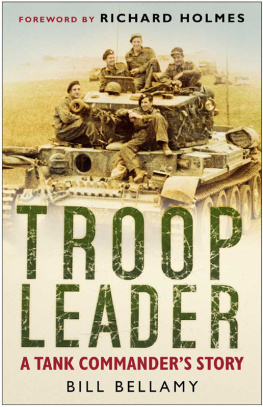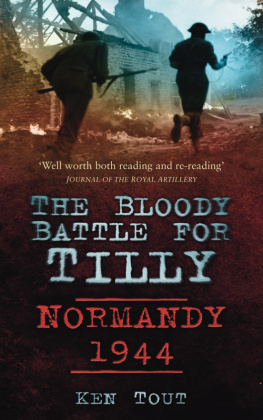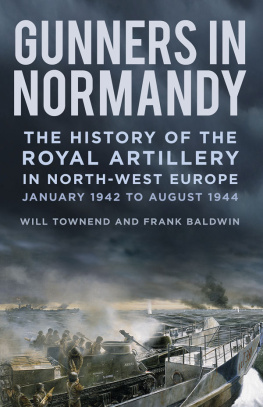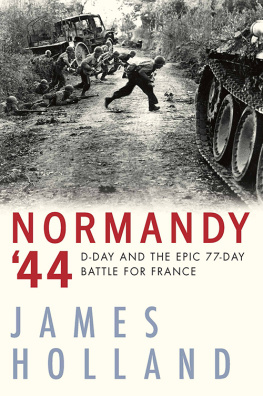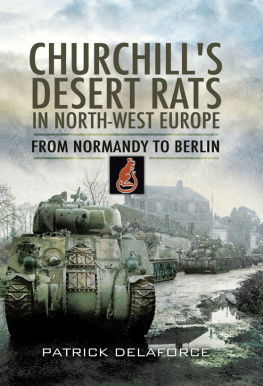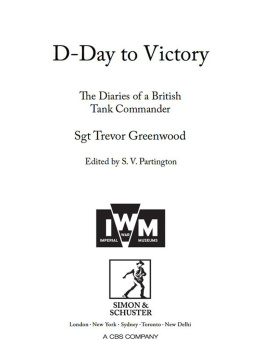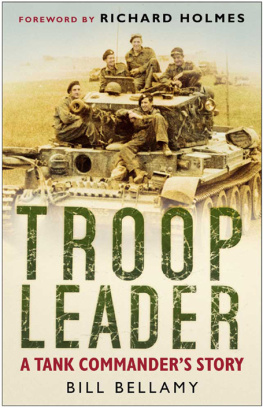Troop
Leader
Troop
Leader
A TANK COMMANDERS STORY
BILL BELLAMY
Foreword by
Richard Holmes

First published in the United Kingdom in 2005 by Sutton Publishing Limited
Paperback edition first published in 2007
The History Press
The Mill, Brimscombe Port
Stroud, Gloucestershire, GL5 2QG
www.thehistorypress.co.uk
This ebook edition first published in 2013
All rights reserved
Bill Bellamy, 2005, 2013
The right of Bill Bellamy to be identified as the Author of this work has been asserted in accordance with the Copyrights, Designs and Patents Act 1988.
This ebook is copyright material and must not be copied, reproduced, transferred, distributed, leased, licensed or publicly performed or used in any way except as specifically permitted in writing by the publishers, as allowed under the terms and conditions under which it was purchased or as strictly permitted by applicable copyright law. Any unauthorised distribution or use of this text may be a direct infringement of the authors and publishers rights, and those responsible may be liable in law accordingly.
EPUB ISBN 978 0 7524 9561 3
Original typesetting by The History Press
Contents
Foreword
I have always enjoyed writing, observes Bill Bellamy at the start of this book, and it shows in the pages that follow. His account of life in the 8th Kings Royal Irish Hussars is a masterpiece of military history in the minor key. He is not preoccupied with big battles or great generals, but with the day-to-day minutiae of a tank regiment in North-West Europe in 19445. It is an affectionate snapshot of the army of sixty years ago, and also a penetrating insight into the age-old alchemy that binds men together in the claustrophobic world of the tank troop and armoured vehicle crew.
The recurrent themes, never laboured but always there, are decency and duty. Bill Bellamy went from public school to the army as a private soldier at the age of eighteen. Once trained, he went to Sandhurst, where he learnt very little of technical or tactical value, but imbibed a philosophy of duty which put others first. He just managed to join his regiment in North Africa before it came back to England for D-Day. After landing on Gold Beach he spent the first weeks of the campaign responsible for his squadrons transport, leading trucks full of fuel and ammunition forward at night through the bocage south of Bayeux.
Soon given a troop of Cromwell tanks to command, he fell under the spell of his squadron leader, a demi-god, totally unflappable and always prepared to listen, and the inevitable intimacies of life inside a steel hull brought him close to the men he commanded. Death plucked away his comrades, and the rough little realities of war made their mark. Dust, funnelled in through a tanks few apertures, gave crewmen conjunctivitis; piercing sunlight and frequent use of binoculars brought temporary blindness; and the half-crushed body of a German at a crossroads gave a sense of revulsion and sacrilege .
Having been involved in Operation Goodwood and the fighting around Mont Pinon, Bill Bellamy took part in the great sweep into Belgium, which ended in wintry stalemate on the Dutch border. Although worldly wise in many ways, he remained nave in others. News of his Military Cross was followed by a party, but when his landlady came and sat on his bed he did not quite realise that she was offering to complete my evening in the traditional way! And he no longer looked the smart cavalry officer: I wore pyjamas under my underclothes, a thick shirt and sweater, corduroy trousers and that marvellous fur-collared American jacket. His mother was killed by one of the first V2 rockets to hit London, but hatred for the Germans was soon blunted by the sight of the ruins of Hamburg and, after the war had ended, by the suffering of the population of Berlin, where life was cheap.
This memoir gives affectionate sketches of the characters that no regiment, then or now, can be complete without, like the decorated trooper who greeted him with the irreverent exclamation: Cor, fg schoolboys now, the debonair captain with sleek black hair well buttered back, and the solid and capable Bill Pritchard, doyen of troop sergeants. It speaks volumes about the British army at the end of a long war and about British soldiers across so much of history.
Richard Holmes
Preface
I have always enjoyed writing. As a child, and later at boarding school, this took the form of essays and poetry. When I went into the Army at the end of 1941, I continued this practice and wrote accounts of my experiences almost as they happened, a habit which continues to this day. These, together with notes, maps and photographs, were tucked away in a box which I retained when Ann and I were married in 1950. For the first forty years or so, I didnt want to think about the war, but some time after I had retired the box came out of the attic and down to my office.
My wife suggested that I should put the material into book form and give copies to our family, both as a record of my early years in the 8th Kings Royal Irish Hussars and of my participation in the campaign that took place in north-west Europe in 19445. I did so, and produced a few copies of a book which I called Schoolboys War on my computer. In the event it proved an interesting exercise. It recalled, in a very special way, a most exciting period of my life and made me realise how fortunate I was to have survived, when so many of my friends perished. I was very lucky.
It is by its nature a very personal account, perhaps rather nave, but then I was quite young. Apart from correcting several minor mistakes and expanding one or two points for the sake of clarity, the book is exactly as written shortly after the events which it describes took place.
I owe special thanks to my wife, who was a constant source of encouragement; to Alan Howard, who served alongside me as my Troop Corporal and was a valuable source of information; to Major Bill Best, our LAD officer, for the free use of his library of war photographs. It is a great shame that none of these is alive now to see it published.
I am also deeply grateful to Professor Richard Holmes who has not only been most encouraging but also has written the Foreword, and to the staff at Sutton Publishing who have been such a pleasure to work with.
Bill Bellamy
ONE
From School to Regiment
S tick to your original ambition, my boy, said my father, join the Royal Navy! Make a career of it. He was visiting me at my school, Blackfriars, Laxton, making me the envy of my peers. He was an heroic figure to us, having recently escaped from France via Brest. At that time he was camp commandant of 1st Armoured Division and was completing his embarkation leave before departing once more, this time for Egypt. I saw him positively blossom in wartime. He had served in France in 1918, loved all that was military, and had rejoined the Army in 1938. I longed to follow his example and join up. My constant prayer was that the war would not finish before I was old enough to fight.
My final term at Blackfriars was a busy one, I was head prefect, captain of the rugby team, patrol leader of the Owl Patrol, and a lance corporal in the Wakerley and Barrowden Home Guard. At the same time I was, theoretically, attempting to get enough passes in the Higher Certificate to allow me to read history at Peterhouse. I found it very difficult to concentrate on anything except the war, which at this time was going very badly for the Allies. My mother and grandmother lived together in Shepherds Bush, West London. The bombing was intensifying and there were concerns over their safety. My mother, a dress designer, had been given war work and appointed to assist in the distribution of meat to the ships in the Thames. Her places of work were Smithfield Market and the London docks, both being the most heavily bombed areas. I took to going to Mass at 6 every morning, followed by a 4-mile run and a cold shower. This was intended to make me fit both spiritually and physically.
Next page
